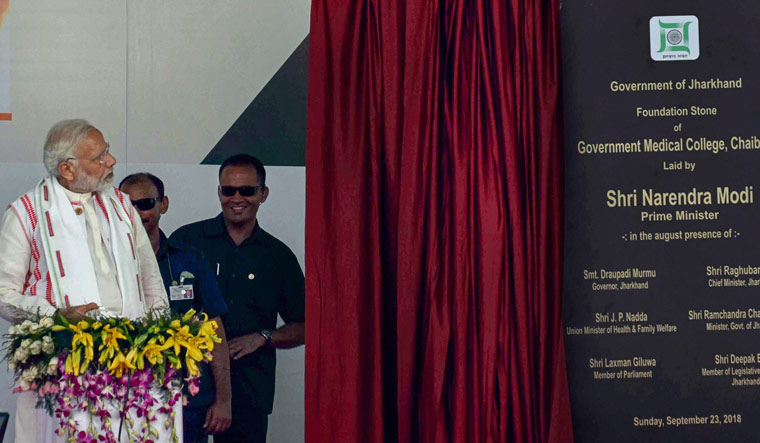A Parliamentary panel has termed the Narendra Modi government's flagship Ayushman Bharat health insurance scheme a modification of the Rashtriya Swasthya Bima Yojana (RSBY), and said that over half of its proposed beneficiaries already stand covered by existing government-supported programmes.
The RSBY was launched by the Manmohan Singh government in 2008.
The Parliamentary Standing Committee on health and family welfare stated this in its 112th report on the action taken by the government on the recommendations/observations contained in the 106th report on Demands for Grants 2018-19 of the Department of Health.
It said the National Health Protection Scheme (NHPS), also known as the Ayushman Bharat scheme, was announced in the 2018-19 budget and it was the world's largest government-funded healthcare programme with 50 crore prospective beneficiaries.
"The new scheme is just a modification of the earlier scheme, RSBY. Over half the target beneficiaries proposed to be covered under the NHPS already stand covered today by existing government-supported schemes," the Parliamentary Standing Committee on health and family welfare said.
"What would indeed have been a step forward is if it covered out-patient treatment as well, but that is lacking. Many states have, in fact, opted out of the RSBY in favour of the state-run schemes and some states are trying out the trust-based model," the Parliamentary panel added.
The Parliamentary committee said a recent comprehensive review on various studies related to the RSBY revealed that in the majority of studies there was an increase in out-of-pocket expenditure related to the scheme, while only two of 14 studies showed a reduction in expenditure.
The NSS data on the RSBY showed that enrolment was quite low: only 57 per cent of those eligible were enrolled and less than 12 per cent of the eligible people got their hospitalisation covered through the programme, it said.
The committee, thus, recommended that the government form a panel to analyse the failures of the RSBY and ensure that inadequacies plaguing its operation and implementation were not repeated.
It also recommended that the NHPS must have first claim on the proceeds collected from health and education cess, and fund constraint should not be allowed to come in the way of its implementation.
The committee observed that the impressive economic progress made during the last two decades had not resulted in commensurate investment in the health sector, as a result of which India continued to lag behind many developing countries on health indicators on the global comparison matrix.
The lack of financial commitment for translating healthcare goals into action was evident from the fact that though the government expenditure in the health sector had marginally increased as a per cent of the GDP over the years, it has stagnated at around 1.2 per cent of GDP, it said.
The panel said the current pace of the year-on-year budgetary allocation for health was unlikely to reach the targeted level of 2.5 per cent of the GDP by 2025.
"Due to the low government expenditure on health, most spending on healthcare is paid out of pocket. Due to which out-of-pocket expenditures have emerged as a major cause of poverty for low- and middle-income families," it said.
Recognising this, the committee, while making its recommendation in the report, highlighted that the allocated funds would not only fall short of meeting the current requirements for certain proposed/ongoing health schemes, but also impinge upon achieving the target of 2.5 per cent of the GDP as public health expenditure by 2025.


